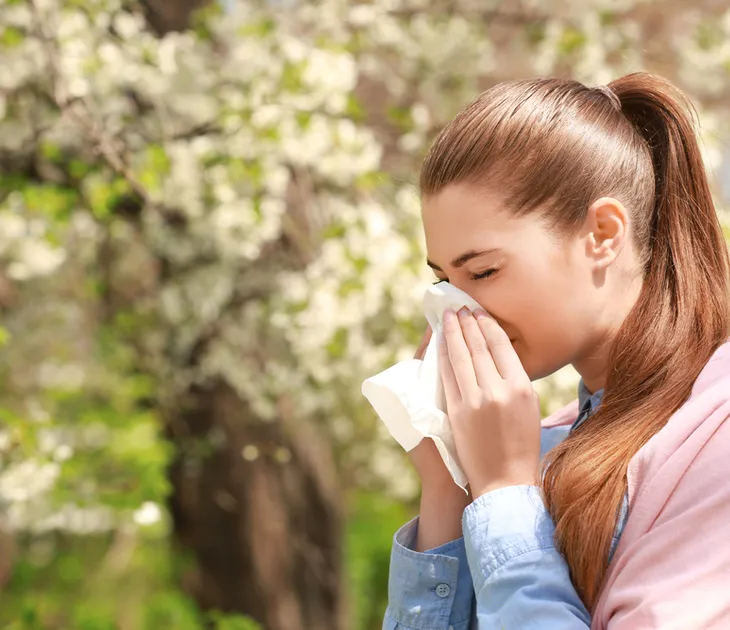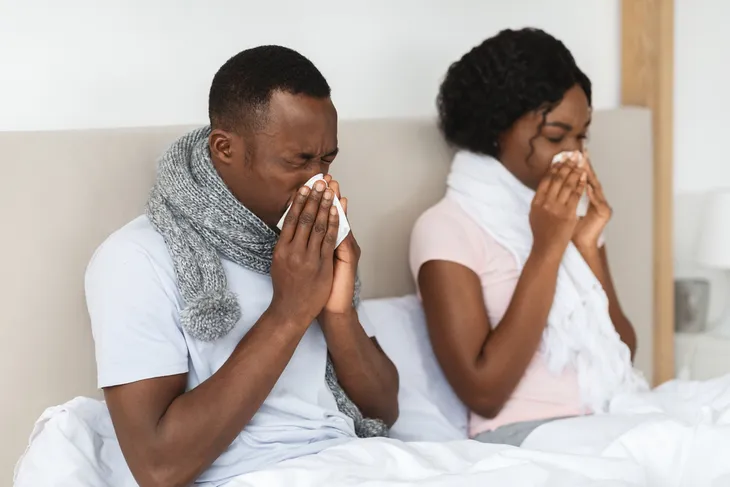As the seasons change and the temperatures fluctuate, it’s common for many people to experience symptoms such as a runny nose, cough, and fatigue. But is it a cold or allergies? Determining whether your symptoms are caused by a cold or an allergy can be a challenge as both conditions share similar symptoms. However, knowing how to tell the difference is crucial for effective treatment and management.
In this article, we’ll explore the similarities and differences between colds and allergies and provide tips on how to identify which condition you may be suffering from. Read on to discover how to differentiate between a cold and an allergy, and learn about the most effective ways to manage your symptoms.
What Are Allergies?
According to the Mayo Clinic, allergies occur when “your immune system reacts to a foreign substance.” Common allergy triggers are dust, mold, fungi, pet dander, and pollen. If you have allergies and come into contact with the allergen, your immune system identifies it as a threat and produces antibodies to fight it off. This process triggers the release of histamine, which induces inflammation and other allergy symptoms.
The severity of the reaction can vary from person to person and range from minor irritation to a more serious anaphylaxis reaction (which is a potentially life-threatening emergency). While allergies can’t be cured, the Mayo Clinic points out that your symptoms can typically be managed.
What Is a Cold?
A cold is a viral infection of the upper respiratory system. It’s caused by various strains of viruses, such as rhinovirus, adenovirus, and others. Unlike allergies, the common cold is highly contagious and can be passed from person to person. In fact, Medical News Today points out you can contract a cold from touching infected surfaces or through direct contact with an infected person, as well as airborne droplets from a cough or sneeze.
Luckily, colds are typically mild and usually resolve within a week or two. However, if symptoms persist, or if there are signs of a more serious infection (such as difficulty breathing or high fever), then it’s important to seek medical attention. You can also reduce your risk of catching a cold by washing your hands effectively and frequently and avoiding close contact with sick people.
Allergies vs. Cold: How Are Symptoms Similar and Different?
Though the common cold and allergies do share some similarities when it comes to symptoms, there are a few distinct differences that may help you tell the two apart. For example, The Mayo Clinic explains that the common cold may cause general aches and pains while allergies don’t produce these symptoms. A fever may also develop when you have a cold but it’s never present with allergies.
Allergies also typically cause itchy eyes but it very rarely occurs with a cold. Additionally, a cold may cause a sore throat but it rarely occurs when you have allergies. The source says the following are symptoms they may share:
- Tiredness
- Sneezing
- Runny nose
- Stuffy nose
If you’re having difficulty determining whether you have a cold or allergies, make a list of your current symptoms and see how they compare.
 Shutterstock/aslysun
Shutterstock/aslysunAllergies vs. Cold: Other Key Differences
When you’re not showing unique symptoms of either allergies or a cold, it can be challenging to identify what you’re suffering from. Luckily there are a few other key differences that can help you tell them apart. Anju Peters, MD, Chair of the American Academy of Allergy, Asthma & Immunology (AAAAI)’s Rhinosinusitis Committee tells Medical News Today that the duration of the symptoms can also be a key indicator of what you’re battling. For example, Peters says a cold typically lasts for a week or so, whereas allergies can persist for much longer.
Colds are usually short-lived, lasting around 7- to 10-days. Allergies, on the other hand, may persist as long as the person is exposed to the allergen. Allergy symptoms may also vary depending on the season or environment, meaning they can come and go. For example, if symptoms appear suddenly while around animals or grass, it is likely due to an allergy rather than a cold.
 Shutterstock/Prostock-studio
Shutterstock/Prostock-studioAllergies vs. Cold: How Are They Treated?
Though allergies and colds can present similar symptoms, the treatment strategies are different. For a cold, the goal of treatment is to manage your symptoms while your body fights off the viral infection. Over-the-counter (OTC) medications, such as pain relievers, decongestants, and cough suppressants, may help alleviate symptoms such as cough, sore throat, and congestion. Getting plenty of rest, staying hydrated, and eating nutritious foods are also important for recovery.
Allergies, on the other hand, can be managed by avoiding the allergen and by taking medication to relieve symptoms. Medical News Today says OTC antihistamines, decongestants, and nasal sprays can help relieve symptoms such as runny nose, sneezing, and itchy eyes. In some cases, immunotherapy may be recommended.
It is important to note that self-diagnosis and treatment can be risky and may lead to more severe health problems. It is always best to consult your doctor for a proper diagnosis and treatment plan.






